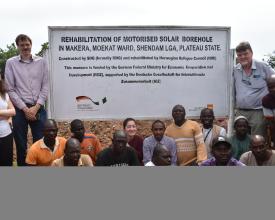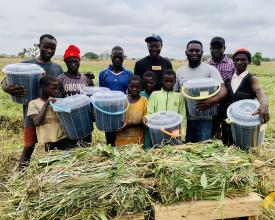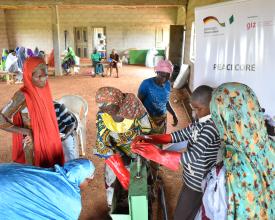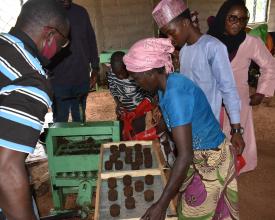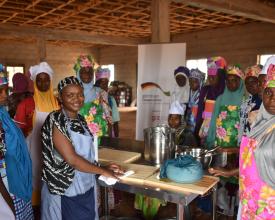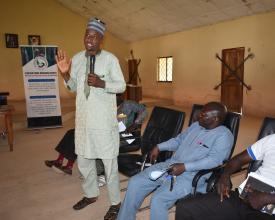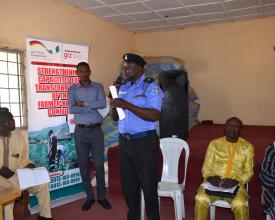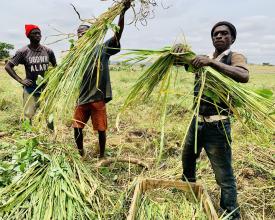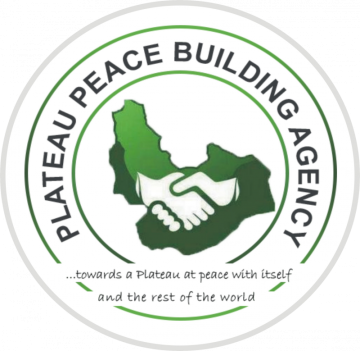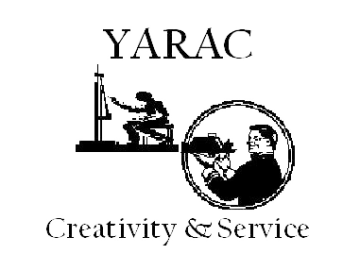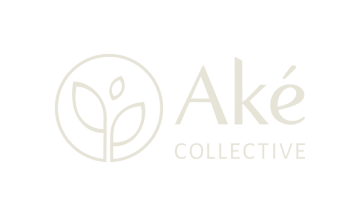
PEACECORE : Renforcement des capacités de consolidation de la paix et de résolution des conflits entre agriculteurs et éleveurs de bétail dans la ceinture médiane du Nigeria
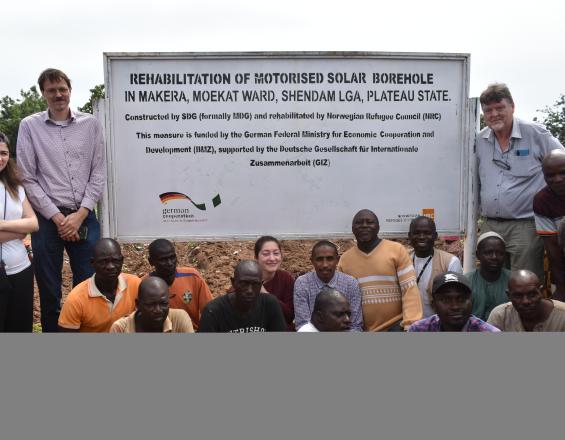
L'État du Plateau, au Nigeria, est affecté par plusieurs lignes de conflit qui contribuent aux tensions et aux conflits violents : les agriculteurs et les éleveurs de bétail se disputent les ressources naturelles telles que l'eau et la terre. Une grande variété d'identités culturelles, religieuses et ethniques sont représentées dans la zone du projet.
Le projet PEACECORE promeut la coexistence pacifique, les moyens de subsistance durables et la sécurité alimentaire. Nous nous concentrons sur la consolidation de la paix par le biais de structures décentralisées de médiation des conflits liés aux ressources naturelles ; les processus de plaidoyer et de dialogue sont soutenus tandis que les structures de traitement des traumatismes sont développées. Nous nous intéressons à l'interrelation entre la coexistence pacifique et l'autonomisation économique des éleveurs de bétail et des agriculteurs. Les agriculteurs et les éleveurs sont formés à divers aspects des pratiques agricoles durables et de la santé animale, les coopératives et les associations sont renforcées et établies, les chaînes de valeur et les moyens de subsistance sont diversifiés, et les mécanismes commerciaux traditionnels sont ravivés.
Contexte
Défis à relever
L'environnement :
- Le changement climatique est un problème majeur, qui accroît la concurrence sur les ressources en eau pour les agriculteurs, les éleveurs et les communautés.
- L'augmentation de la population et l'utilisation extensive des terres ont accru la pression sur les ressources foncières disponibles, entraînant souvent des conflits violents entre agriculteurs et éleveurs.
- L'utilisation accrue de pesticides et d'engrais chimiques a entraîné une détérioration de la santé des terres et une baisse des rendements.
La situation sociale :
- Les facteurs énumérés ci-dessus ont contribué à des conflits récurrents et de longue durée entre agriculteurs et éleveurs et à la détérioration des relations sociales et commerciales. La perte de confiance dans l'État et les agences gouvernementales pour résoudre les conflits a entraîné une aggravation des disparités sociales.
- L'accès légal à la terre est un défi pour ces communautés.
Sur le plan économique :
- Des taux élevés de pauvreté et de chômage existent également dans les communautés ciblées.
- En raison d'un manque de sensibilisation aux compétences alternatives et aux chaînes de valeur, la plupart des habitants pratiquent une agriculture de subsistance et vendent des produits agricoles primaires.
Emplacement
Traiter
Résumé du processus
Les formats de dialogue du CPAF et du PFIM aident le projet à identifier les besoins et les défis prioritaires des communautés et à proposer des solutions probables. D'une part, les projets de moyens de subsistance et les projets de soutien aux moyens de subsistance des connecteurs peuvent être identifiés grâce à ces engagements communautaires. D'autre part, les activités conjointes de commerce et d'échange dans le bloc des moyens de subsistance offrent davantage de possibilités de dialogue constructif. Dans les deux cas, la résilience des participants et des communautés est renforcée, de sorte qu'ils sont mieux équipés pour gérer les conflits par le biais de la médiation et de la résolution pacifique.
Blocs de construction
Plateformes de dialogue communautaire décentralisées
Le projet a réuni les parties en conflit en utilisant des plates-formes telles que le Community Peace Architecture Forum (CPAF) et la People First Impact Method (P-FIM). Cette approche a permis de réunir des personnes au niveau de la communauté pour discuter et résoudre leurs problèmes au niveau local en utilisant des solutions axées sur la communauté. Les communautés ont été en mesure de résoudre les litiges grâce à la médiation du CPAF et de formuler leurs besoins et leurs objectifs grâce à la méthode P-FIM. Tous ces éléments ont aidé le projet à concevoir et à atteindre ses objectifs avec l'adhésion des communautés locales.
Facteurs favorables
1. Implication des acteurs locaux, des parties prenantes et des capacités de consolidation de la paix.
2. Création d'un espace sûr pour le dialogue et les discussions.
3. Renforcement des capacités des organisations locales de la société civile qui connaissent bien les communautés et qui ont leur confiance pour mieux mettre en œuvre les programmes.
4. Stratégie décentralisée.
5. Renforcement des structures de médiation directe en cas de conflit, avec des liens avec les autorités compétentes.
Leçon apprise
1. La médiation est plus facile au niveau local, là où les conflits se produisent, qu'à travers des structures centralisées qui peuvent être plus lourdes et présenter des solutions généralisées qui peuvent ne pas être adaptées aux défis locaux.
2. Les communautés ont la capacité de résoudre les conflits et de s'attaquer elles-mêmes à leurs problèmes de développement. Il convient d'identifier et de soutenir ces capacités plutôt que des solutions externes, car elles sont souvent plus durables.
3. Les approches de bas en haut sont plus efficaces que les approches de haut en bas.
4. La décentralisation des structures de dialogue au niveau communautaire réduit la logistique nécessaire à la conduite de ces dialogues et encourage leur poursuite après la fin des projets.
Approches intégrées de la consolidation de la paix par le biais de moyens de subsistance conjoints
Le projet PEACECORE utilise le soutien aux moyens de subsistance durables et respectueux du climat comme outil pour restaurer les opportunités commerciales et d'échange traditionnelles et en créer de nouvelles pour les agriculteurs et les éleveurs dans six zones de gouvernement local de l'État du Plateau, au Nigéria. L'objectif est de remplacer les comportements négatifs liés aux conflits par des relations économiques mutuellement bénéfiques, tout en soutenant la médiation et le dialogue par le biais du premier bloc de construction. Les participants des communautés touchées par le conflit ont été rassemblés et formés à diverses opportunités de chaînes de valeur dans les domaines de l'agriculture biologique et des produits laitiers, à la formation et au fonctionnement des coopératives, et à la résolution des conflits. Grâce à ces efforts, nous avons pu réunir des groupes d'agriculteurs et d'éleveurs en conflit pour établir des accords commerciaux et former des coopératives autour des chaînes de valeur, notamment la fourniture d'engrais biologiques, la fourniture de bouse de vache et de déchets de culture pour la production de briquettes, la production de fourrage, la production de produits laitiers et de tofu, etc.
Facteurs favorables
- La sélection de chaînes de valeur bénéfiques pour les deux parties, telles que la production de fourrage et d'engrais organiques.
- La solide réputation de la GIZ dans la mise en œuvre de programmes agricoles et de développement a incité les participants à faire confiance au processus.
- La volonté des partenaires en conflit de trouver des solutions au conflit.
- La disponibilité de ressources pour le projet et les initiatives telles que les compétences techniques et l'équipement, le financement, etc. a permis aux participants de créer des structures et des opérations tangibles.
Leçon apprise
- Il est essentiel d'instaurer un climat de confiance et d'impliquer les participants à tous les stades des interventions du projet.
- Ajouter de la valeur aux activités et aux produits existants est un premier pas utile vers l'engagement.
- Les nouvelles idées et les nouveaux processus sont les bienvenus, à condition que les avantages puissent être perçus.
- Il est essentiel d'utiliser des connecteurs (des éléments que les deux parties ont en commun).
Impacts
PEACECORE a touché près de 20 000 bénéficiaires directs. 3 000 ménages d'agriculteurs et d'éleveurs ont reçu une aide à l'agriculture ou à l'élevage, y compris des programmes de vaccination et de santé animale, et 700 ménages ont bénéficié d'une aide pour générer des revenus. 5 300 agriculteurs et éleveurs ont été formés à l'agriculture intelligente face au climat et à la génération de revenus respectueux de l'environnement. Les capacités locales ont été renforcées dans certaines communautés en proie à des conflits grâce à des projets pilotes visant à établir des chaînes de valeur biologiques et de niche telles que l'apiculture, la sauce chili, la régénération des sols, le fourrage, le millet acha (fonio), les briquettes, le fromage et le soja. Plus de cinq coopératives communautaires ont été créées grâce à ces efforts. 600 personnes ont bénéficié d'opportunités de revenus supplémentaires grâce au programme "Argent contre travail" et des formations professionnelles de base ont été dispensées à 500 jeunes. 100 médiateurs ont été formés à la résolution collaborative des conflits au niveau communautaire. Des forums de dialogue décentralisés ont été mis en place pour encourager les contributions locales à la consolidation de la paix. Grâce à ces forums, plus de 50 litiges concernant les ressources naturelles ont été résolus. En outre, 12 psychologues et 30 personnes non spécialisées ont été formés pour fournir des structures d'orientation en matière de traitement des traumatismes et 66 enfants ont bénéficié d'une assistance en la matière. 300 ménages ont reçu des conseils en matière de droits fonciers, parmi lesquels environ 100 ménages ont bénéficié de conseils juridiques.
Bénéficiaires
Nos bénéficiaires sont les suivants :
- Agriculteurs
- Eleveurs
- Femmes des communautés cibles
- Enfants victimes de traumatismes
- Aidants non professionnels
- Médiateurs formés
- Agences gouvernementales telles que le PPBA
- Acteurs communautaires
- Coopératives agricoles
- Consultants, fournisseurs et vendeurs locaux
Objectifs de développement durable
Histoire
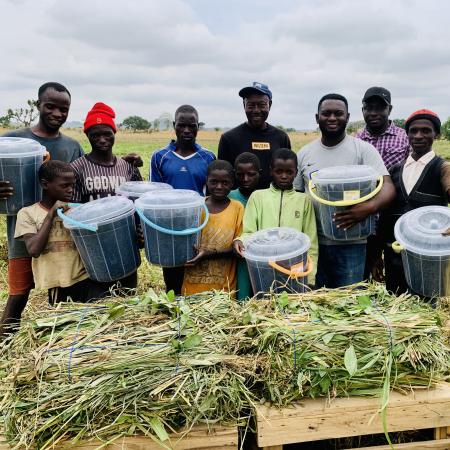
La ferme d'herbe de la communauté d'Ancha Congo : Une réussite
La communauté d'Ancha se trouve dans le quartier Zobwo de la zone de gouvernement local (LGA) de Bassa, dans l'État du Plateau, au Nigeria. C'est l'une des communautés du LGA qui a connu de violents conflits entre agriculteurs et éleveurs, entraînant la perte de nombreuses vies et de biens ces dernières années (en particulier entre 2019 et 2022).
Le projet GIZ-PEACECORE s'est associé à Youth Adolescent, Reflection and Action Center (YARAC), une organisation locale de la société civile, pour mettre en œuvre des activités de consolidation de la paix et de subsistance qui encouragent la coexistence pacifique entre les agriculteurs et les éleveurs dans trois (3) communautés de l'AGL de Bassa, dont la communauté d'Ancha. Le projet a réuni les parties en conflit (agriculteurs et éleveurs) au sein d'une coopérative pour mener des activités agricoles. En 2022/2023, la coopérative, sous la direction et la formation de YARAC, a cultivé de l'herbe du Congo et des haricots Mucuna (voir la vidéo et les photos) ainsi que du maïs. L'herbe du Congo et les haricots Mucuna sont d'une grande valeur pour les agriculteurs et les éleveurs en tant que cultures économiques qui ont une grande valeur nutritionnelle pour le bétail.
